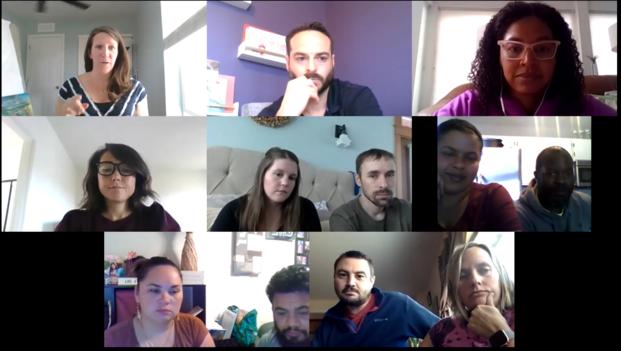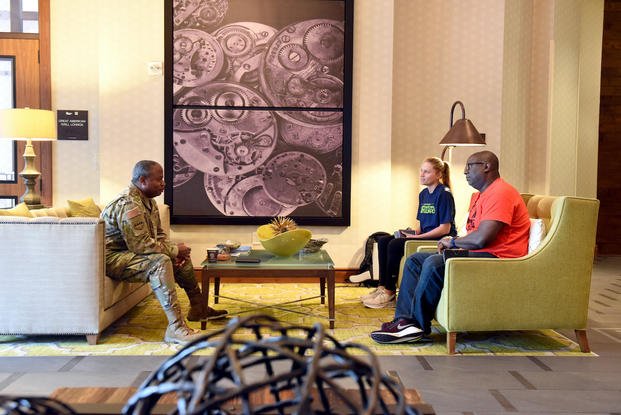School is online, church is online and now some medical appointments are available online. But how do you continue -- or start -- counseling when you can’t even get an appointment for a referral? Welcome to the world of telehealth.
Counseling for Couples
Wounded Warrior Project quickly shifted focus when traditional counseling for couples became a thing of the distant past. “Going to virtual programming was certainly prompted by the pandemic that we are all experiencing and I wanted to make sure that we were able to provide service to the warriors and families that we serve and finding a new way to go about doing that,” said Ryan Kules, combat stress recovery director.
Project Odyssey is a 12-week program with a focus on providing mental health workshops to support wounded vets and their loved ones. There are teaching sessions with other couples and exercises to complete both with others and on their own. The sessions focus on friendship, communication, trust, commitment and conflict management.

Moving them online was a necessity that we may see continued in the future. Kules said the response to the virtual option was “pretty darn impressive.” WWP usually has about ten couples for their traditional Project Odyssey programs and each of the four virtual Project Odysseys are full.
“The recruiting portion was not terribly too difficult,” Kules said. “We added some things in as far as making sure that folks have [the] appropriate technology to be able to participate successfully. But it was not a difficult process, which really showed us really that with folks spending more time together in the pandemic, there is a great opportunity to be able to learn about one another and be able to improve their relationships.”
Currently, these virtual workshops are open to couples, which means a wounded warrior and their significant other. WWP has offered Project Odyssey workshops specifically for female warriors and for male warriors to meet with each other without their spouses or caregivers.
For more information and to apply for WWP’s Project Odyssey program, visit their website.
“We have our alumni program that is spreading some amazing opportunities like building models together virtually, which is something that we hadn't done before, but are really pivoting quite amazingly to be able to serve folks in a very, very unique time that we're all experiencing.”
Options for Families
Military and Family Life Counselors (MFLC), a program available through your local military base, are working through telehealth options as well, for adults, families and children. Each installation has information regarding their particular MFLC and the school should also have information for their designated MFLC and guidance counselors.
These are nonmedical counseling services, but they are designated to help military students in particular navigate the unknown of the current situation as well as the other struggles unique to military life, such as having a parent deployed or facing an upcoming move.
Many therapies and counseling services have switched to an online interface to continue meeting with their patients. Stephanie Northington, Ph.D. sees many military patients at her practice near Fort Gordon, Georgia, and has been able to adapt some of them for tele-mental health.
“Not everything can be done online,” Dr. Northington explained. “Specific things we can’t do online include assessments and testing.” But she has found ways to interact with patients and their parents, offering tips and suggestions on navigating this new season.
Battling Screen Fatigue
The importance of balancing screen time and interpersonal relationships has been a concern since distance learning, remote working and social distancing has become the norm. Screen fatigue is affecting everyone, especially those who aren’t usually on it. Zoom calls are exhausting, and the idea of setting up another one for counseling can be overwhelming.
Northington has found the most success in her older teenage and young adult patients. “They are more capable and able to vocalize, they have more insight and more patience than the younger kids,” she said.
WWP and Kules are aware of and working on it. “So, the screen fatigue that folks are seeing is certainly something that we are all cognizant of. And the way that we have set up this programming is it's a 30-minute session once a week,” Kules said.
After their session, or at some point throughout the week, the couples are provided with opportunities to interact with each other. They also have the opportunity to connect with staff members facilitating the sessions via phone, text and email.
Keep Up with the Ins and Outs of Military Life
For the latest military news and tips on military family benefits and more, subscribe to Military.com and have the information you need delivered directly to your inbox.
--Rebecca Alwine can be reached at rebecca.alwine@monster.com. Follow her on Twitter @rebecca_alwine.










